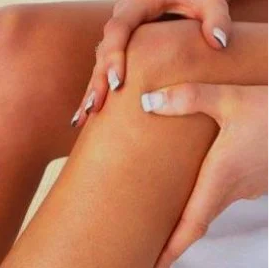
Knee pain is a widespread symptom that signals trouble in the body – the appearance of the disease of the joints or just the increased load on their feet.
Mind here is of a man who never felt pain in my knees in a certain period of life. Discomfort, clicking or pain of varying intensity in the knee joints occur in both adults and children because of many reasons. The older the person becomes, the higher the likelihood of various diseases, the first symptom of which is pain in the knees. This is due to the age peculiarities of the body: slowing of metabolic processes, wear of cartilage, accession of other problems with the musculoskeletal system, vessels, nerves.
Due to the complicated anatomical structure and many structures experiencing high loads, and often overloads, the knee joints are very vulnerable. Any damage to any structure element, for example, bursal, leads to the violation of motor function of the knee and, consequently, pain. Ligaments and menisci are considered the most vulnerable, they then there is the repayment of debt in 80-85% of cases.
The anatomical structure of the knee
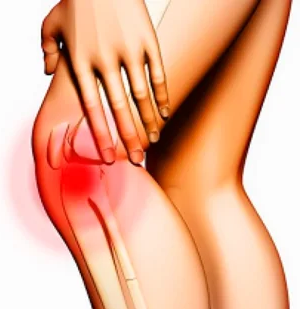
The knee comprises the knee joint, the distal end of the femur and two condyles podmienkami, tibial long bones, soft muscles, nerves, blood vessels, and when the binding apparatus of the patella (kneecap), joint bags and menisci.
The knee joint is one of the major joints of the body. To the top choice femur. The articular surface of the lateral (outer) and medial (internal) condyle articulates with the patella and tibia. The meniscus, which is a connective tissue cartilages serve as shock absorbers of the joint. Thanks, is the rational distribution of body weight on the tibial plateau and increases the joint's stability. Thin, double-headed, paliperidonesee and other soft connection sinhroniziruete capsular-ligamentous structures providing motor activity of the knee joint.
The elements of the knee joint are connected by multiple ligaments. Inside the joint there are two cruciate ligaments – back and front. Podmyshalsky bedernau bone connection is connected to the fibula and tibia bones when collateral duties. Oblique popliteal connection, the headband is at the back of the Bursa of the knee joint. From a number of joint cavities secrete the main synovial capsule not communicating with the joint. The blood supply of the elements of the knee is carried out through a network of blood vessels, and innervation – nerve fibers.
Causes of knee pain
There are many causes of soreness of the knee joints, which can be divided into several groups.
Traumatic lesions of the knee elements:
- Knee injury. As a result of rupture of vessels is local hemorrhage in the m tissue of the joint. Redness, swelling, nerve damage leads to pain, difficulty of movement.
- Full or partial rupture of ligaments. Often diagnosed partial violation of the integrity of the internal lateral ligament arises from the excessive eversion of the tibia outwards.
External when the bandage is torn less than that of the internal. This is due to the strong deviation of the tibia inwards with the exposed legs for example. Cruciate ligament inevitably accompanied by hemarthrosis.
Complete rupture of both ligaments is often associated with damage to the joint capsule, tearing of the internal meniscus. Such trauma leads to excessive mobility of the knee joint, accompanied by severe pain, the intensity of which depends on the degree of rupture.
- Hemarthrosis of the knee joint – the outpouring of blood into the joint cavity. Sometimes traumatic and non-traumatic nature. Traumatic hemarthrosis occurs when the meniscus ruptures, complete or incomplete rupture of ligaments, intra-articular fractures, contusions the knee region. Non-traumatic option is one of the symptoms of diseases characterized by increased fragility of vascular walls or violation of blood coagulation system. These include hemophilia, scurvy, severe forms of hemorrhagic diathesis. Accumulated in the joint cavity of the roof compresses the tissue, disrupting the blood circulation in them. A special pigment – hemosiderin – negative impact on the ligaments, hyaline cartilage, synovial bag, leading to loss of their elasticity. Result of the defeat of the articular Bursa is swelling of the villi and increased production of joint fluid. The result of repeated hemorrhage becomes degeneration and joint destruction.
- Knee miniscope – violation of the integrity of the menisci of the knee joint. In the lateral form is damaged outer meniscus, when the medial internal. This is one of the most frequent but difficult to diagnose injuries of the knee joint. At risk of the disease are not only athletes involved in intense exercise, but also ordinary people. A meniscus tear can occur from a sudden unusual movement when turning the body, the exposed legs, a strong blow to the knee.
- Patellar luxation – an abnormal displacement of the patella. The injury is not diagnosed more than 0.7% of cases from total number of dislocations. Often occurs dislocation of the external, rarely internal, very rarely vertical and torsion. In case of incomplete dislocation of the patella is determined on the lateral (outer) condyles, while the full outside from the lateral condyle.
- Closed or open fractures of the knee joint, upper part of leg bones or the lower portion bedernau bones. Such injuries are often combined with lesions of the soft tissues of the knee, causing massive hemorrhage, excessive movement in the knee region, its deformation.
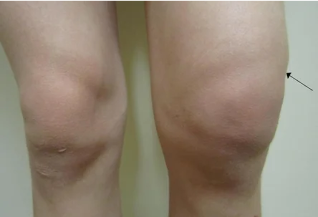
Inflammatory and degenerative-dystrophic diseases of the articular elements of the knee:
- Arthritis – inflammation of the knee joint. A similar mechanism of development of pathology observed in the osteoarthritis, ankylosing spondylitis, rheumatoid arthritis, gout (the deposition of urate in joints).
- Osteoarthritis (gonarthrosis) with damage to the knee joint of non-inflammatory nature, affecting all of its structure and leads to severe degenerative changes.
- Bursitis inflammation of the synovial Bursa leads to pain during flexion-extension movements in the knee.
- Periarthritis of the tendons of the knee – inflammation of the capsule of the goose legs, knee joints, and also muscles and ligaments surrounding the joint. The pain occurs mostly while descending the stairs, especially with a heavy load and focuses on the inner surface of the knee.
- The chondropathy patella , degenerative-necrotic changes of the articular cartilage (rear) surface of the patella. The degree of destruction may be different from areas of the lung to soften cracks and complete Erasure.
- Chondromatous is a serious chronic disease caused by dysplastic process with islet regeneration areas of the membrane of the joint shell in the cartilage of gondrom. It is not excluded ossification of cartilage separate bodies.
- A Baker's cyst – the formation of a tight elastic, rounded tumor masses in the popliteal fossa, located on the opposite side of the patella. The cyst is clearly visible in the unbent condition of the knee. Causes discomfort, pain in the popliteal region. With a significant size, constrict the blood vessels and the nerve, leading to disruption of innervation and blood circulation.
- Goff's illness – a disease accompanied by the defeat and subsequent revival of the adipose tissue that surrounds the knee joint. The pinching, swelling, and other injuries of fat cells – adipocytes – end substitution of dense fibrous tissue. In the end, the buffer function of the fat cushion" is broken, the very fatty tissue become not able to perform the role of shock absorber.
- Disease Osgood–Schlatter – disease, characterized by necrosis lumpy part of the tibia. Diagnosed in adolescents from 10 to 18 years involved in sports. Below the patellar joint is painful lump, if untreated, lead to restricted movement of legs or complete immobilization, and malnutrition of the muscles.
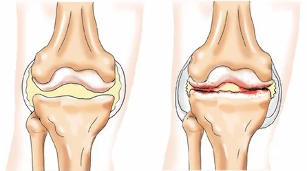
Diseases in which the possible irradiation of pain in the knee region:
- Coxarthrosis of the hip – chronic lesion of the hip joint, which is accompanied by progressive degeneration and degenerative changes in it. Often the pain extends down along the outer surface of the femur to the knee or below.
- Neuropathy of the sciatic nerve is a non – inflammatory lesions of the nerve as a result of compression of the compression or spazmirovannah vessels. This nerve to reach the stage, beginning in the lumbar region and passing through the tailbone and pelvis. The blockade at any one point on it leads to disturbance of sensation or pulsating pain.
- Fibromyalgia – extra-articular lesion of soft tissues non-inflammatory nature with totality of symptoms such as arthralgia, muscle weakness, depression, etc.
Some systemic diseases that can cause pain in the knees:
- Osteoporosis is a disease of the skeletal system, chronically progressive course, changes the mineral composition and bone density. "Washout" of calcium from bones leads to their fragility. The process is accompanied by aching or aching in the limbs.
- Tuberculosis of the bones. Tuberculous lesions of the area of bone leads to severe pain permanent.
- Osteomyelitis is a disease of infectious-inflammatory nature, affecting all the structural elements of the bones. The result of both specific, such as, tuberculosis, and nonspecific, often coccal, osteomyelitis becomes flushing of the skin, swelling, local pain in the bones and soft muscles, febrile temperature.
- Some infectious diseases. When Reiter's syndrome, in addition to engaging in the process of the urogenital tract and eyes, affects the joints. One of the manifestations of Lyme disease is arthralgia.
VD pain in my knees
Depending on etiology, the nature and intensity of the pain can be different.
- Aching. Arthritis, osteoarthritis.
- Pungent, strong. Fractures of elements of the knee, torn ligaments, acute bursitis, a knee injury, aggravation of miniscope, deforming osteoarthritis.
- Pulsating. When running deforming arthrosis, injuries of the meniscus.
- Drill. Osteomyelitis.
- Stupid. With bursitis, chronic Legg.
- Burning. Upon compression of the sciatic nerve, tuberculous process in the bone.
- Shooting. If the infringement of the nerve trunk.
- Pain when walking. When the Baker's cyst, bursitis, arthritis, gonarthrosis, periarthritis.
- The pain alone. Gout, arthritis.
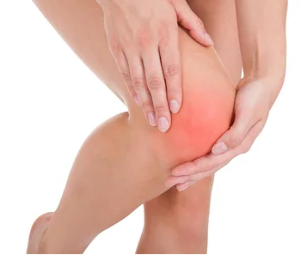
Diagnosis of pathologies causing pain in the knees
Fizikalna survey:
- medical history and complaints;
- a visual examination with palpation of the knees.
Laboratory tests:
- biochemical and clinical blood tests;
- serological examination of blood;
- immunological analysis of blood;
- rheumatologic samples;
- bacteriological analysis of synovial fluid.
Instrumental-invasive methods:
- arthroscopy;
- puncture of joint capsule;
- needle biopsy of bone.
Non-invasive diagnostics:
- radiography of the knee joint;
- densitometry;
- ultrasound examination of the joint;
- An MRI or CT scan.
Treatment knee pain
If the pain in one or both knees of the non-traumatic nature of occurrence, should go first to the therapist, who, on the basis of patient's complaints and results of tivnogo inspection, send to a specialist – orthopedist, a rheumatologist, neurologist or phlebologist. With any knee injury you need to pay to the surgeon or the traumatologist-orthopedist.
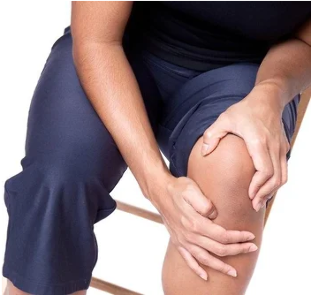
Treatment in each case is different, depends on the cause of pain, i.e. the injury or illness. For each disease has its own treatment regimen. But first the patient must observe a few General rules:
- significantly reduce the duration of walking and being on your feet throughout the day;
- athletes temporarily (until recovery) to abandon training, and ordinary people from running or jumping;
- when increased pain to completely abandon of movements imposed on the knee locking pow the combination of an elastic bandage;
- wear a bandage or communication connection for immobilization of the knee joint;
- when injury cold to the place of trauma exposure.
Rheumatoid, psoriatic arthritis, systemic autoimmune disease requires serious and comprehensive treatment, carried out over many months. Basic therapy consists of immunosuppressive drugs, nonsteroidal anti-inflammatory and hormonal drugs, gold preparations, etc.
In the treatment of bursitis used painkillers and anti-inflammatory medication. If there is an infection, a course of antibiotics. Therapeutic puncture of the bag to be carried out to remove excess fluids from the synovial cavity and/or administration of corticosteroids. From chronic inflammation of the Bursa helps to get rid of surgery – surgical bunion surgery.
When deforming osteoarthritis effective intra-articular injections of corticosteroids, prolonged use of NSAIDs, and chondroprotectors. For pain locally appointed compresses with Dimexidum, or bischofite, creams and gels with anti-inflammatory action. Helps massage, physiotherapy, therapeutic exercises. Severe lesions of the knee require surgery – arthroplasty of the hip.
Treatment of osteoporosis is you take bisphosphonates calcitonin, calcium, vitamin D, etc.
Treatment of meniscus tear can be conservative or surgical. Conservative therapy consists of the use of analgesics, NSAIDs, hyaluronic acid, chondroprotectors. But first, reposition the joint.
ViDi interventions:
- meniscectomy;
- partial (partial) meniscectomy;
- transplantation of the meniscus;
- arthroscopy;
- arthroscopic stitching of the torn meniscus.
With any knee injury after treatment a very important period of rehabilitation, which should take place under the supervision of a physiotherapist or a podiatrist. The doctor composed an optimal recovery of joint function. The main methods of postoperative rehabilitation are considered massage and medical gymnastics. Also effective lessons on special simulators, gradually developing knee joint.












































